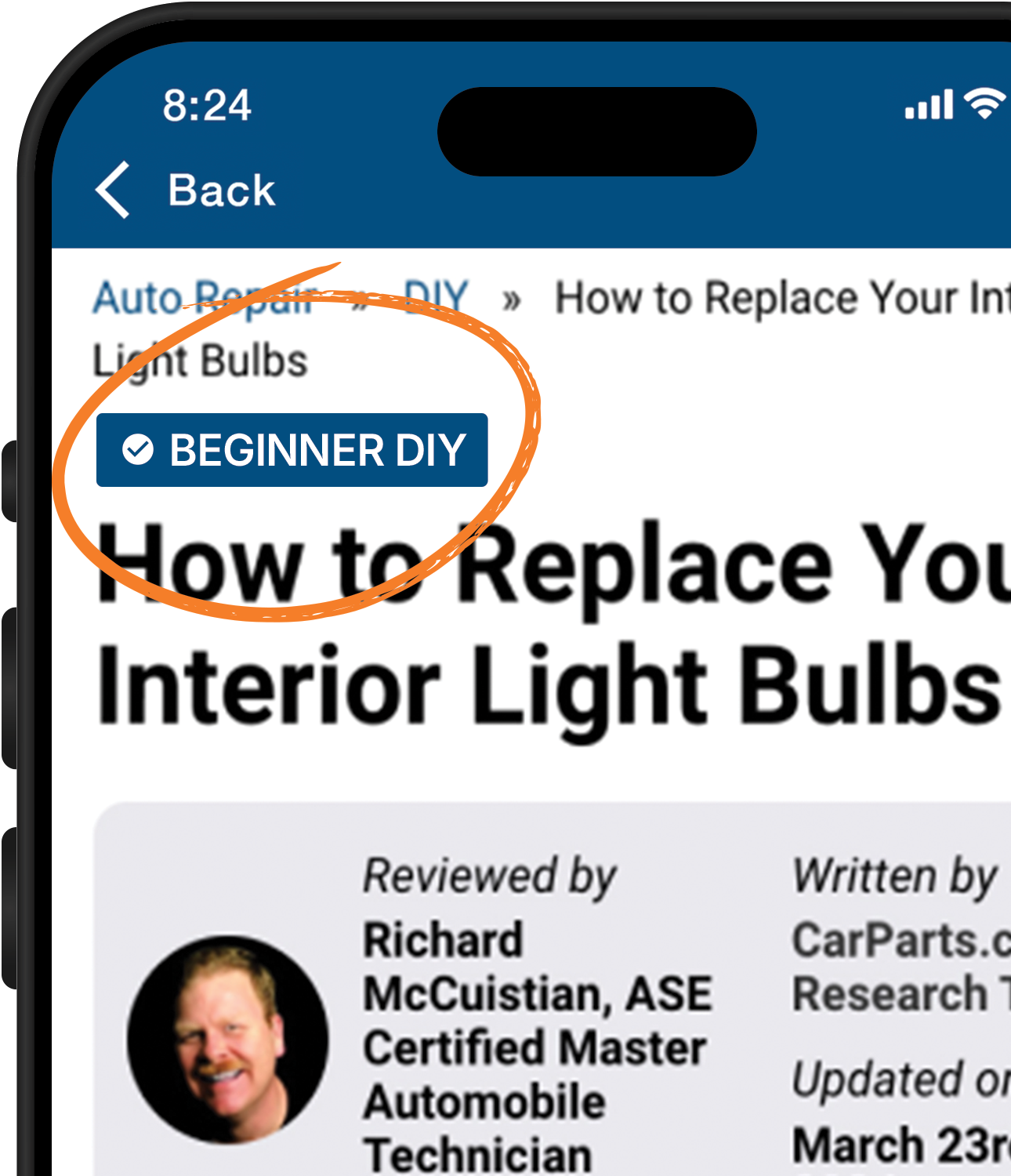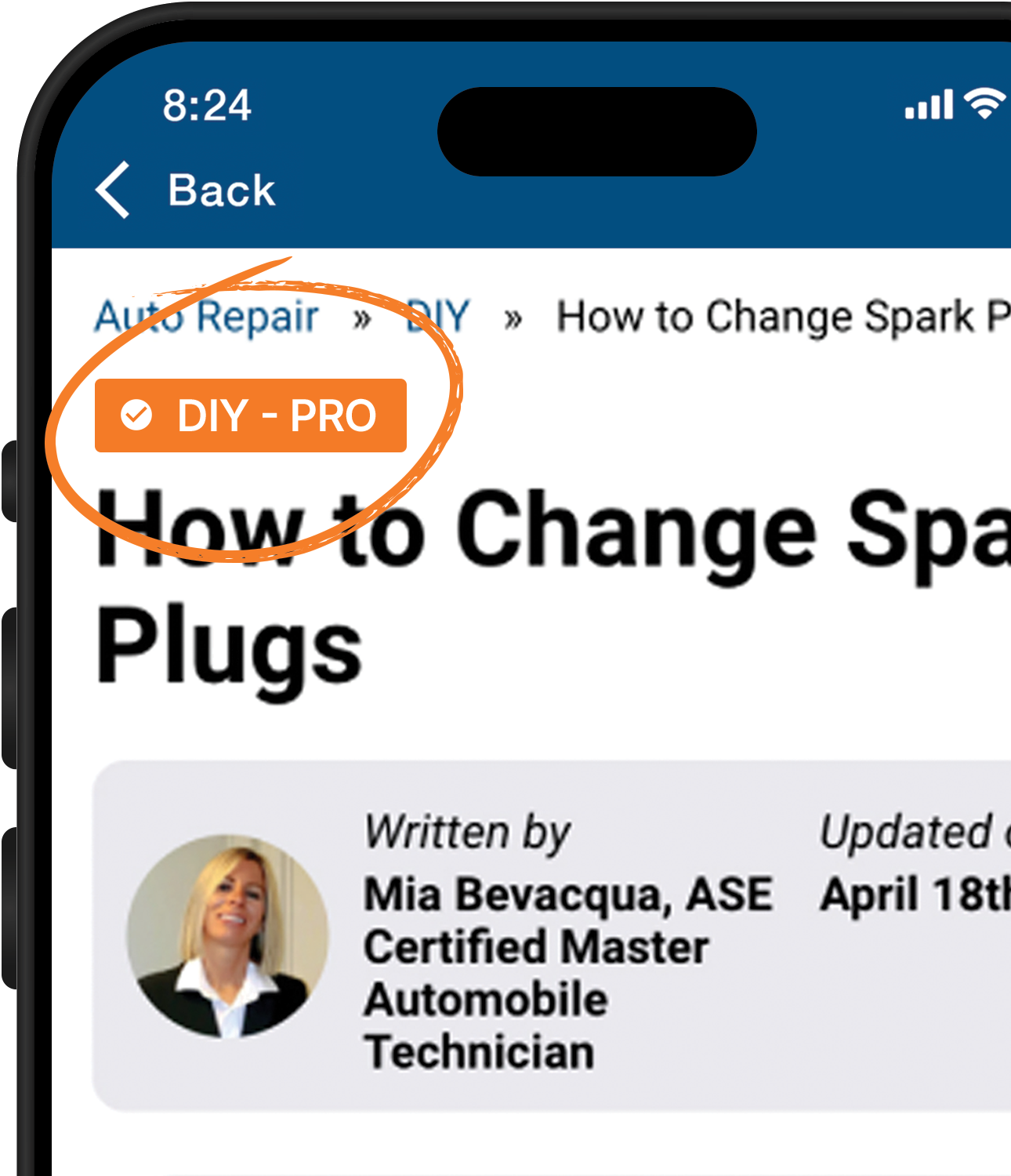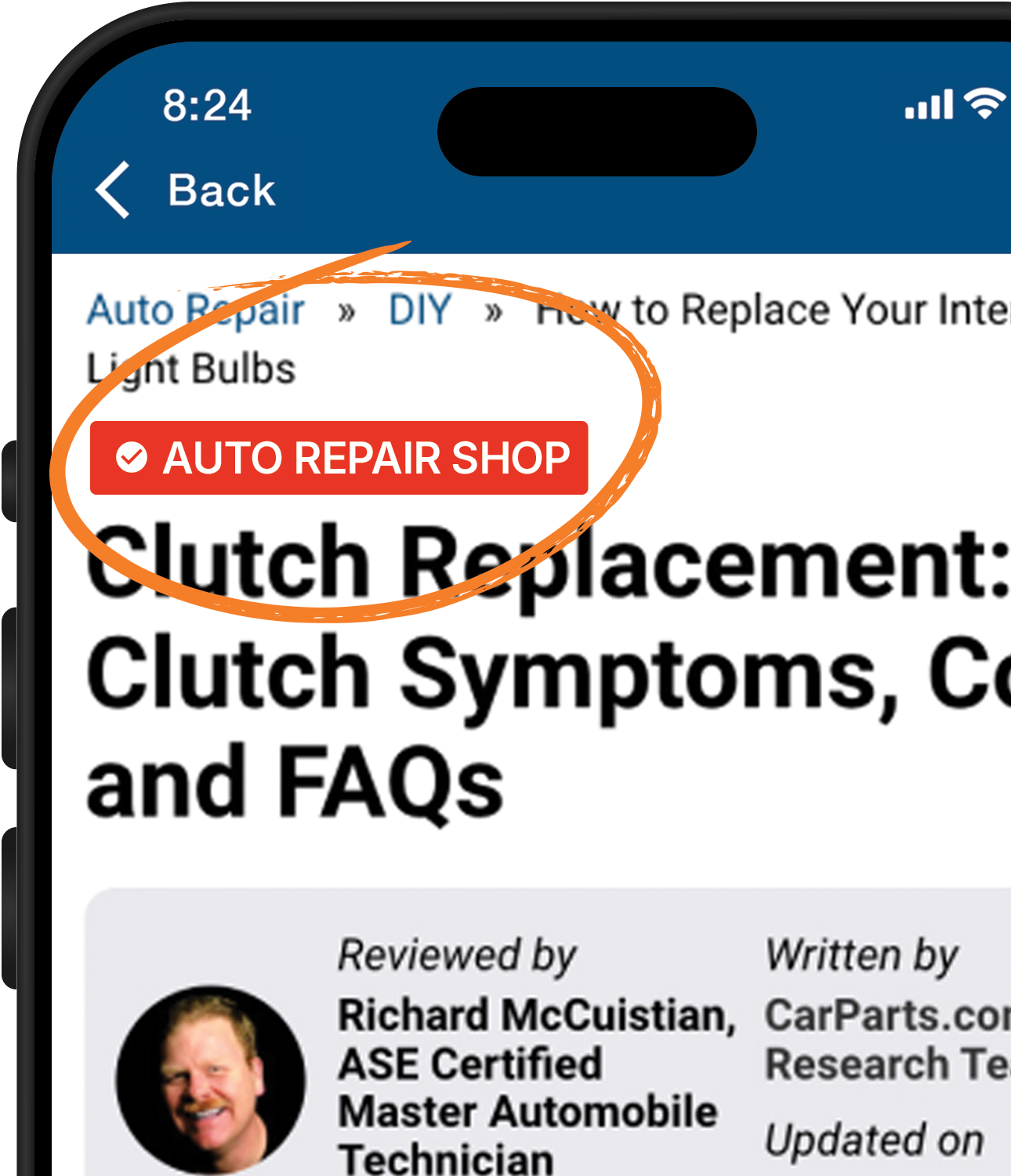
List of Car Repairs (Beginner - Pro): Search a Repair
Our database includes thousands of car repair and diagnostic articles. Whether you need tips on how to pull off a repair job or just additional information about an issue you have with your vehicle, we have the best resources for you. Hit up the search bar to find repair information now.


Should You Do It Yourself or Leave It to a Mechanic?
The difficulty of car repair tasks can range from beginner-friendly ones to tougher jobs that only a certified mechanic can figure out.
Always consider the need for natural aptitude and gumption. Without these, any DIY person can easily get in over their heads, wasting valuable time and money in the process.
Again, vehicle repair operations rest on a sliding scale, both in troubleshooting as well as in doing the work. The inability to troubleshoot a problem too often leads to replacing unnecessary parts. If that isn't enough, you might successfully replace a failed part only to have the new part fail soon afterward if you aren't savvy enough to figure out what caused the first part to fail.
So, having the know-how to find the problem by gathering and analyzing data is a huge part of the process. Too many people will get bad advice and opt to replace a part they can see and change easily, but sometimes that also turns out to be the most expensive part.
There are some problems you can see, but other car problems will produce symptoms and it's not always easy to determine the cause.
Find Repair Resources in Our Database That Match Your Needs
A newbie driver can replace a cracked gas cap or change a pair of crusty wiper blades without fail. However, tasks like finding the reason a particular fuse keeps blowing or replacing a water pump and some hoses, and then burping the coolant system are better left to an experienced DIYer with enough knowledge and skills in auto repair.
But if we're talking about transmission troubles, ignition system issues, and other repairs that require extensive know-how of the intricacies of the engine, a trained professional would be your best bet at resolving them.
Of course, an experienced DIY person can usually replace spark plugs, replace the belt and tensioner, and, in some cases, service the automatic transmission, change engine oil, etc., but even some of these jobs require more knowledge and ability than a beginner might have.
To help you determine which repairs on our database can be done at home and which ones are best handled at a fully equipped auto shop, we've categorized tasks according to the following levels, which you will find indicated by badges:

Beginner-friendly repair tasks are those that take no more than a few simple tools (like screwdrivers and wrenches) to accomplish. These are plug-and-play jobs that take less than an hour to finish.
These repairs are relatively minor tasks that often involve replacing faulty parts that are bolted with nuts, screws, and caps, as well as dismantling plastic panels.

Intermediate DIY repair tasks usually take an hour or two to accomplish. These often require advanced auto repair knowledge, including navigating electrical diagrams and other vehicle systems.
Intermediate repair tasks can be a one or two-man job, depending on their complexity. A lot of these tasks might require you to get down and dirty with your vehicle, dealing with greasy parts and draining contaminated fluids.

The nitty-gritty of car repair is best left to the professionals. Complex tasks concerning engine, transmission removal, and underbody repairs involve using heavy equipment you normally won't keep in your garage, such as compressors, lifts, and hoists.
Major auto shop repairs can take anywhere between a couple of days and an entire week to accomplish.
Car Repair and Maintenance Jobs for Beginners
Labor rates aren't cheap, which is why many drivers prefer to do simple car repair and maintenance tasks on their own.
A cabin filter replacement, for example, costs anywhere between $30 and $45. On top of that, professional installation can range from $30 to $40. Should you decide to do the task on your own, you can keep the $40 to yourself and spend it on something useful instead.
It won't cost you anything to read about how the job is done, and you'll even learn a skill or two along the way.
Another upside to taking the DIY route is that you get to decide when to tackle the repair. You won't need to schedule an appointment with a local repair shop because you can deal with the task at your most convenient time.
It might take a couple of hours for a professional to change your engine oil, given that auto repair shops cater to a lot of vehicles daily. But if you've got the right tools and skills, the task will probably take no more than an hour, and you'll be ready to get back on the road in no time.
The path to becoming an experienced DIYer starts with a conscious effort to save costs and time. And if you want the same things these DIYers do, you can begin by tackling simple car repair and maintenance tasks like the following:
- Sagging Car Door Repair
- Pulling Out Small Dents
- Applying Wax or Polishing Compound on the Car
- Wheel Stud Replacement
- Cabin Air Filter Replacement
- Engine Air Filter Replacement
- Wiper Blade Replacement
- Car Battery Replacement
- PCV Valve Replacement
- Interior Light Bulb Replacement
- Windshield Washer Reservoir Replacement
- Windshield Scratch Removal
- Adhesive Removal
- Bumper Scratch Removal
- Rear Window Defroster Repair
- Rear View Mirror Reattachment
- Car Battery Testing
- Leather Seat Repair
- Floor Mat Cleaning
- Air Vent Cleaning
- Paint Removal
DIY to Pro Level Repairs
There are only a handful of car repair and maintenance tasks that you can do via the DIY route. When the job calls for some heavy lifting and an eagle-eyed pro, it's time to pay a visit to your local repair shop.
In most cases, regular maintenance tasks are the ones you can do in your own garage.
You'll find many online resources tackling fluid changes and top-ups. Basic part installation guides are also common, especially ones that can help you replace your broken side mirror, fuse, and tail light, among others.
Generally, how well you can handle a repair will depend on your skills, confidence, knowledge, and tools. However, keep in mind that some tasks are best left to a mechanic.
Jobs that go beyond the scope of regular maintenance are the ones that call for a trusted professional.
For example, underbody noises such as clunking and grinding usually point to suspension problems, which you could end up misdiagnosing if you're not well-versed in auto repair.
Collision damage is another problem you should leave to a mechanic.
While it's fairly easy to fit a new bumper cover over your vehicle, tasks like aligning the bumper and wheels and installing a new airbag might require equipment you won't normally find in your garage.
Remember that there's a fine line between a DIY and a pro-level repair job. Consider performing the task at home if it ticks the following boxes:
It's a regular maintenance job.
You have sufficient auto repair knowledge for it.
You have the right tools for it.
Youre confident enough to perform the repair without issues arising in the future.
Here's a list of repair and maintenance tasks you can usually perform in your garage, depending on the type vehicle you have:
- Ignition Coil Replacement
- Oil Change
- Spark Plug Replacement
- Fuel Filter Replacement
- Fuel Injector Cleaning
- Headlight Assembly Replacement
- Oil Pump Replacement
- Drive Belt Replacement
- Front Brake Pads Replacement
- Transmission Fluid Service
- Coolant Flush
- Radiator Hose Replacement
- Flat Tire Replacement
- Brake Bleeding
- Burping Coolant System
- MAP Sensor Cleaning
- Stripped Oil Drain Plug Removal
- Gas Tank Cleaning
- Tail Light Assembly Replacement
- Radiator Replacement
- Relay Checking
- Power Steering Pump Replacement
- Heater Core Flushing
Note: Again, some of the jobs listed here are very easy on some vehicles but very difficult on others. Headlight assembly replacement on some Hondas, for example, requires removal of the front bumper, which is quite involved.
Best Done at an Auto Shop
Auto shops and trusted mechanics will give you the best shot at resolving your vehicle's issues.
A lot of drivers prefer leaving their vehicles in the hands of a professional, especially when the affected car part can greatly affect their safety.
Such repairs include airbag and windshield replacements as well as brake installation and rotor resurfacing. Addressing complex electrical work concerning sensors and other critical parts is also a common auto shop job.
An auto shop will also have the necessary equipment when the repair calls for taking out the engine or transmission, or if there's a need to weld a couple of metal parts together.
Hiring an expert mechanic guarantees that your vehicle will receive top-tier services regardless of the type of repair. Experts notice even the smallest details about the cars they're working on that most DIYers tend to miss.
Taking your vehicle to a trusted auto shop will cost more than conducting the repairs on your own. On the upside, you'll be leaving your vehicle in the hands of a skilled professional who can restore the roadworthiness of your daily driver.
Below are common repairs you might want to leave to the pros:
- Brake Adjustment
- ABS Sensor Replacement
- Driveshaft Replacement
- CV Axle Replacement
- Engine Oil Cooler Assembly Installation
- Engine Coolant Temperature Sensor Replacement
- Starter Wiring
- Unblocking a Catalytic Converter
- Leaf Spring Bushing Replacement
- A/C Condenser Replacement
- Transmission Module Reset
- Transmission Gasket Replacement
- Rack and Pinion Replacement
- Clutch Replacement
- Torque Converter Replacement
- CV Boot Replacement
- Engine Bay Cleaning
- Wheel Alignment
- Fusible Link Replacement
- Carburetor Adjustment
- Brake Caliper Replacement
Saving on Vehicle Repair with CarParts.com
When it comes to offering the best replacement parts at the best prices, no one does it better than CarParts.com.
Never worry about going over budget when you shop from us. All our products come with a low-price and lifetime replacement guarantee, helping you get the best value for your money.
Our unbeatable prices are paired with uncompromised quality. All products in our catalog are vetted by a team of industry professionals for guaranteed fit and performance.
Repair Guides Vetted by Professional Mechanics
Here at CarParts.com, we are committed to guiding our customers in every step of their journey towards getting their daily drivers back on track.
Together with our OE-grade products, our car care and repair resources are designed to make part replacement and installation tasks quick and easy. Like our products, our repair guides undergo thorough fact-checking and reviewing by a team of Automotive Service Excellence (ASE)-certified automobile technicians.
You can trust CarParts.com to give you accurate technical information regarding your repair needs, as we also source our content from product specialists, ASE certification guides, auto repair software programs, and automotive technology textbooks.
ASE-Certified Master Automobile Technicians
When it comes to fixing your car, you can't trust just anybody because your safety is paramount. For this reason, CarParts.com works with ASE-certified automotive technicians to produce the most helpful, accurate repair guides online.











